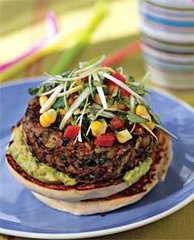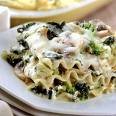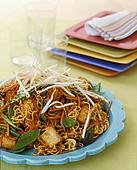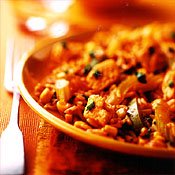My seven year old is a vegetarian. When she started her quest of avoiding meat we thought just cutting out meat itself would be enough, but it has become a journey of shocking, jaw-dropping discovery at just what contains ground-up animal parts. As a result, I am now a veggie. So I have gone from researching good recipes and nutritional information, which is essential for such a young vegetarian, to the family taking on a healthier, more compassionate outlook on life.
Saturday, 21 April 2007
The essentials......
The nutritional needs of vegetarian children are vitally important to bear in mind, as they are growing they require essential vitamins and minerals to help bones and teeth grow, the repair of body tissue, etc.
To ensure a healthy vegetarian diet here are the main vitamins and minerals that should be included.
Protein
Protein has many important functions in the body. It is essential for the growth and repair of body tissues and therefore particularly important for growing children.
Good vegetarian sources of protein: dairy products (milk, cheese, yogurts); eggs; nuts (hazel, brazil, almonds, cashew, walnuts, pine kernels, chestnuts, pistachio); seeds (sesame, pumpkin, sunflower); grains (wheat in bread, flour, pasta, oats, maize, rice, breakfast cereals); soya products (tofu, soya milk); pulses (peas, beans, lentils, peanuts).
Iron
Iron is essential for the formation of red blood cells.
Good vegetarian sources of iron: cereals; dark green leafy vegetables (spinach, cabbage, watercress); dried fruit; wholemeal bread; nuts; beans and pulses.
Zinc
This essential mineral is involved in a number of body processes, including growth.
Good vegetarian sources of zinc: yeast; nuts; dairy products; whole grain cereals; beans and pulses.
Vitamin B12
This vitamin is needed by the body in minute amounts for growth and the formation of red blood cells.
Good vegetarian sources of Vitamin B12: dairy products; eggs; fortified products (breakfast cereals, yeast extract, soya milk).
Vitamin D
Vitamin D is essential for growth, the absorption of calcium and the formation of strong bones and teeth.
Children have an increased requirement for vitamin D because of their growing bones; they may need a supplement, especially in the winter months, as it is made by human skin when exposed to the sun.
The vitamin is available in a number of different forms - D3 may be of animal origin so strict vegetarians should take D2.
Good vegetarian sources of Vitamin D: egg yolks; milk. All margarines, breakfast cereals and soya milk are fortified with vitamin D.
Riboflavin
Riboflavin or vitamin B2 is essential for the release of energy from food. Dairy products are a good source but cereals are relatively lacking.
Good vegan sources of riboflavin: yeast extract; almonds; green vegetables and pulses.
Calcium
Essential for the formation of strong bones and teeth, calcium is therefore of great importance to children and young people.
Good vegetarian sources of calcium: milk; yogurt; cheese; eggs; sesame seeds; almonds; brazil nuts; tofu; dried fruit; fortified soya milk; green leafy vegetables; pulses.
Calcium is more easily absorbed from dairy products than from other sources.
To ensure a healthy vegetarian diet here are the main vitamins and minerals that should be included.
Protein
Protein has many important functions in the body. It is essential for the growth and repair of body tissues and therefore particularly important for growing children.
Good vegetarian sources of protein: dairy products (milk, cheese, yogurts); eggs; nuts (hazel, brazil, almonds, cashew, walnuts, pine kernels, chestnuts, pistachio); seeds (sesame, pumpkin, sunflower); grains (wheat in bread, flour, pasta, oats, maize, rice, breakfast cereals); soya products (tofu, soya milk); pulses (peas, beans, lentils, peanuts).
Iron
Iron is essential for the formation of red blood cells.
Good vegetarian sources of iron: cereals; dark green leafy vegetables (spinach, cabbage, watercress); dried fruit; wholemeal bread; nuts; beans and pulses.
Zinc
This essential mineral is involved in a number of body processes, including growth.
Good vegetarian sources of zinc: yeast; nuts; dairy products; whole grain cereals; beans and pulses.
Vitamin B12
This vitamin is needed by the body in minute amounts for growth and the formation of red blood cells.
Good vegetarian sources of Vitamin B12: dairy products; eggs; fortified products (breakfast cereals, yeast extract, soya milk).
Vitamin D
Vitamin D is essential for growth, the absorption of calcium and the formation of strong bones and teeth.
Children have an increased requirement for vitamin D because of their growing bones; they may need a supplement, especially in the winter months, as it is made by human skin when exposed to the sun.
The vitamin is available in a number of different forms - D3 may be of animal origin so strict vegetarians should take D2.
Good vegetarian sources of Vitamin D: egg yolks; milk. All margarines, breakfast cereals and soya milk are fortified with vitamin D.
Riboflavin
Riboflavin or vitamin B2 is essential for the release of energy from food. Dairy products are a good source but cereals are relatively lacking.
Good vegan sources of riboflavin: yeast extract; almonds; green vegetables and pulses.
Calcium
Essential for the formation of strong bones and teeth, calcium is therefore of great importance to children and young people.
Good vegetarian sources of calcium: milk; yogurt; cheese; eggs; sesame seeds; almonds; brazil nuts; tofu; dried fruit; fortified soya milk; green leafy vegetables; pulses.
Calcium is more easily absorbed from dairy products than from other sources.
Subscribe to:
Post Comments (Atom)
































1 comment:
Great blog! My daughter is three and has always been a vegetarian by choice. Thanks for all the helpful info.
Post a Comment